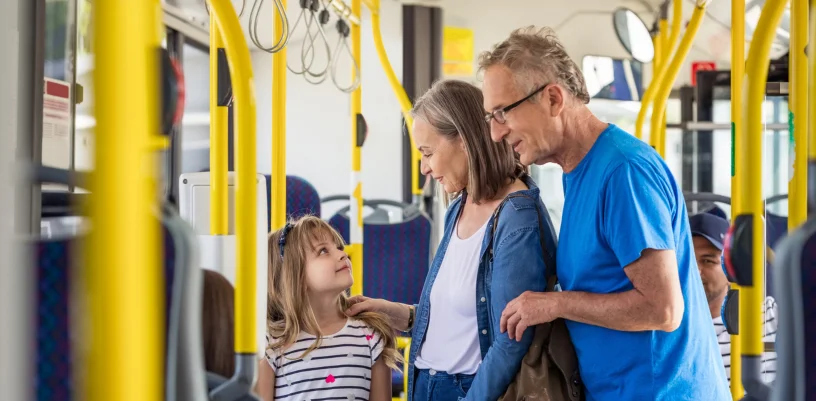Your challenges
Bus Service Operators Grant (BSOG) certification
Common mistakes applying for your certification and how to avoid them
CONTACT US


Complex and ever-changing rules
We are the leading BSOG auditors – certifying over 90% of the annual UK Government expenditure. Over the years we have developed auditing techniques and identified industry specific business processes to ensure that the claims we certify are accurate, compliant and therefore maximised.
With complex and ever-changing scheme rules, you need to feel confident that you’re receiving the BSOG funding you’re fully entitled to.
Follow our four-point plan below to help you avoid the common pitfalls when claiming BSOG, and prevent queries, delays and reductions following the submission of your claim.
Take a deep dive into each step for more detailed guidance, including the key questions you need to address to spotlight areas for improvement, and give you the confidence your claim is accurate.
1. Eligible kilometres
When preparing the eligible kilometres section of your claim, you need to address following questions:
Since the devolution of BSOG for tendered operations to Local Authorities back in 2013, operators have been required to separate out the eligible live and dead kilometres on their year-end return between commercial and tendered. Given the significant difference in the BSOG rate between commercial and tendered operations (34.57p / litre) it is essential that you correctly allocate mileage between the two categories.
We regularly identify instances where operators incorrectly classify deminimis arrangements and section 106 funded operations as tendered, rather than commercial, and as such understate their claim. We identified one such incident recently whereby the claim was subsequently increased by £50k.
Tip – prior to completion of the claim form, review your Local Authority contracts to identify all those operations that are actually tendered, ensuring that deminimis and s106 are treated as commercial for BSOG purposes.
Following a complete review of the eligibility of school services, the DfT introduced an additional requirement that all such services must be registered solely as “normal stopping” in order to be claimable for BSOG.
Operators often forget this and register services as “school / works” (which should only be used for closed-door contracts) rendering them ineligible for BSOG. Earlier this year an operator was unable to claim for a school service due to this oversight, costing the company £7k in lost BSOG.
Tip – check the DVSA website to ensure that your eligible school services are registered as “normal stopping”. If they are shown as “school / works” or “limited stop” then contact the Traffic Area Office for the registration particulars to be updated as soon as possible.
On receipt of the PSV311 claim form, the DfT will check the service registration details on both the previous return and the DVSA website. Where the details cannot be agreed, queries will be raised, delaying the settlement of your claim.
Velociti are ensuring that all our estimate and certified claim submissions are submitted with a comparator schedule, which compares the submitted data with the previous year’s submission; providing explanation for the changes. This has significantly reduced the level of queries being raised by the DfT.
Tip – ensure that the registration details on your return are complete and up-to-date to avoid delays and the cashflow implications this brings. By updating Velociti’s incident management (BIRS) system this information will be reported automatically on both the year end return and the estimate submission.
There’s great emphasis on operators to capture lost mileage not only for BSOG purposes, but also as a KPI to measure reliability. However, many fail to record the consequential gained mileage that often results from breakdowns, changeovers, etc. – thereby understating their claim.
Tip – as part of your lost mileage recording, introduce a process which at the same time captures the additional mileage for inclusion in your BSOG claim. For users of Velociti’s incident management (BIRS) solution, the system automatically prompts for entry of the additional mileage, storing a database of common journeys and a complete audit trail in the event of an inspection by the DfT.
For users of electronic scheduling systems, the incorrect tracing of a route or an input error can have a huge impact on the route mileage, resulting in an incorrect BSOG return.
Tip – users of our incident management system have automatic access to the Schedule Audit Tool, which performs several tests to check the integrity of the mileage in the schedule – whether this is from Velociti, Trapeze, Austrics, Optibus, etc. Every time a new schedule is produced, the SAT programme should be run, anomalies investigated and where necessary the schedule updated before processing.
2. Fuel consumption factor
When compiling the fuel consumption factor section of the claim, need to address following questions:
Missing fuel has a huge impact on the value of the BSOG claim. From unprocessed fuel sheets, data loss from electronic fuel systems and faulty pumps, you need to make sure that all fuel issued on-site has been recorded. There may also be the odd occasion during the year that vehicles have fuelled off-site – again, have you captured it?
Tip – basic house-keeping checks such as reconciling the recorded issues to the pump meter movement and stock, will help you to identify where fuel has been omitted. A listing from your accounts system of all external fuel purchases will help to establish those instances of fuelling away from base. We also suggest that once a year you have your pumps checked by an independent engineer to ensure they are correctly calibrated.
Whether you’re using cab-odometers, hub-odometers or electronic on-board devices, accurate vehicle mileage is essential not only for your BSOG claim, but also for tyre leasing charges and monitoring your fleet’s fuel consumption rates.
Tip – where vehicles are reporting anomalous MPGs check your mileage equipment:
- Cab-odometers – confirm the unit of measurement; being aware that on many new vehicles drivers can change the unit between miles and kilometres. Those processing fuel and mileage data through VFM should consider this as a possible explanation when investigating significant changes in odometer movement.
- Hub-odometers – check the correct model is fitted based on the tyre size of the vehicle. We have previously identified a complete batch of vehicles that had the wrong hub-odometers due to the fitment of low-profile tyres.
- On-board devices – compare the elapsed cab-odometer movement to the mileage reported by the OBD to identify those vehicles that need to be recalibrated.
Many operators believe that when compiling the total vehicle kilometres and fuel issues for the claim form, they must include all the local service PSVs.
However, since the devolution of BSOG on tendered services to Local Authorities back in 2013, operators are now asked to base their fuel consumption figures on those vehicles that operate predominantly on commercial services.
As vehicles operating on tendered services are usually smaller more fuel-efficient vehicles, operating at non-peak times in less congested areas, their removal tends to improve the value of the BSOG claim. By following the DfT guidance, an operator’s claim was recently increased by £84k.
Tip – review your fleet and only include those vehicles in your claim that have predominantly operated mileage on commercial services during the claim year.
3. Incentive payments
Over the years the DfT have introduced incentives to boost operators BSOG payments – from increased rates for using Automatic Vehicle Location (AVL) equipment and smartcard ticket machines, through to additional payments for operating Low Carbon Emission Buses (LCEBs). For some operators, these incentives have a significant impact on the BSOG claim value.
To ensure you don’t miss out on incentives that you are entitled to, ask yourself the following questions when preparing your claim:
The AVL incentive provides operators with an additional 2% BSOG for fitting their fleet with equipment that provides locational GPS data to a back-office system.
The payment is based on the percentage of the fleet fitted with fully functioning equipment at year end. Therefore, where the AVL equipment has failed and not reported data, the vehicle will be excluded and your claim value will be reduced accordingly.
Tip – in our experience, operators usually have a number of systems in place that would qualify for the AVL incentive: such as those used for RTI, driver telematics, ticket machines, vehicle tracking, etc. Where a vehicle might not qualify under the main AVL system, you should check other systems that provide locational data which will enable you to claim all of the incentive.
The LCEB incentive pays operators an extra 6 pence per kilometre for those vehicles certified as being low carbon. When first introduced in 2010 this mainly applied to hybrid vehicles. However, with the advancement of technology, including the fitment of start / stop systems, lighter bodies, etc. more and more diesel vehicles are now able to meet the LCEB qualifying criteria.
We have come across several instances where operators have introduced these ‘efficient diesels’ into their fleet, but the person compiling the claim has been unaware that the vehicles have been certified as Low Carbon – thereby running the risk of not maximising the LCEB claim. It should be noted that the DfT will request to see a copy of the manufacturer’s LCEB certificate for each vehicle, confirming that they qualify as LCEBs.
Tip – ensure that the person responsible for your claim is aware of vehicles that qualify as LCEBs. The certificate should be placed on the vehicle maintenance file, with a copy sent to the certifying auditor in advance of year end. For those users of Velociti’s Vehicle; Fuel & Miles (VFM) system we suggest that the vehicle type is denoted as such to ensure the correct vehicles are captured.
The LCEB incentive is based on the mileage operated by the vehicle, therefore it is imperative that the mileage reported is correct. However, where mileage recording equipment such as cab-odometers, hub-odometers, etc. fails during the year, you need to ensure that the mileage reported for the low carbon claim is correct.
Tip – where odometers fail, mileage should be estimated by applying the average mpg for the vehicle type to the fuel issued. For users of our VFM system the ‘estimate mileage’ function can be used to perform this calculation.
4. Estimate accuracy
Naturally, discussion of BSOG tends to focus on the year-end BSOG return that operators prepare throughout the year, which is ultimately certified by a qualified independent auditor like us.
However, in advance of this, operators will have already prepared and submitted the yellow PSV310 estimate form, detailing the eligible commercial kilometres that they expect to run for the forthcoming year and the projected vehicle kilometres and fuel usage that will be required. Based on this information, the DfT make the four quarterly payments on account. Any problems with the submission or processing of this form can result in payment delays which can have a huge impact on cashflow.
Operators also need to be aware that once the form has been processed, the Department will not accept revised submissions where mileage had previously been omitted – therefore it is essential that the form is correct and submitted on time.
- Submit 3 to 4 weeks before year-end to ensure there is enough time for any DfT queries to be resolved.
- Ensure that tendered mileage is not included to avoid any queries from DfT.
- Complete the mileage comparator to help the DfT process the claim – this should compare last year’s estimated mileage by service (live & dead) to this year’s estimate. Reasons should be provided for all increases over 15%.
- Check that the kilometres per litre calculated at section 3 of the PSV310 yellow form is within 1kpl of the last estimate return. Such a change would represent a significant difference in operation / fleet composition and you will need to provide a reason to the DfT.
- For all new services appearing in the claim you must include timetables, maps and farecharts.
- The operator declaration at page 4 should be signed by a director of the business. The Department have recently advised that this should be a statutory director as listed at Companies House.
Latest news and industry insights
Meet your trusted advisor
With over 23 years’ experience in the industry, Sarah Bayliss is responsible for the BSOG consultancy and certification.
Her team of industry-leading auditors, with over 100 years of claiming experience between them, have built up a vast knowledge of the BSOG scheme and business process improvement – advising both operators and Government bodies.
“Using our experience and knowledge, we will ensure that your BSOG claim is accurate, compliant and maximised, and we will also be there to manage all correspondence with the Department for Transport on your behalf – giving you back precious time and money to focus on optimising other areas of your business.”
BOOK CONSULTATIONExperience and expertise
30+ years
developing leading passenger
transport solutions
- Market leader in driving efficiency for
passenger transport operators of all sizes - Software innovation driven by an in-depth
understanding of the passenger transport industry - Strong track record of quality delivery and
high customer satisfaction





